King of Comedy (1982)
“Why not me? Why not? A guy can get anything he wants as long as he pays the price.”
|
Synopsis: |
|
Genres, Themes, Actors, and Directors:
Response to Peary’s Review: It’s difficult at first to know how to react to Pupkin (De Niro is in top form), who is single-minded in his devotion to “making it” as an entertainer, but utterly out of touch with the reality of what such an endeavor entails — especially given that the “reality” of achieving any kind of fame in show business, no matter how fleeting, is so nigh impossible that resorting to drastic measures may actually make some kind of sense. Peary and countless other critics give away the fact that Pupkin ultimately “triumphs” in his goals (making it on to Jerry Langford’s show), so I’ll mention it as well — and truth be told, this ending may very well be the only one that could have worked. No matter how much of a “despicable leech” Pupkin is, he’s also undeniably pathethic — a true loser who perhaps (perhaps!) deserves his chance in the limelight, if only as evidence of his sheer gumption and warped savvy. Several “big names” were considered for the role of Jerry Langford (including Frank Sinatra, Orson Welles, Dick Cavett, Sammy Davis, Jr., and Johnny Carson), but Lewis was an inspired casting coup, given his real-life designation as the “king of comedy”. Meanwhile, Bernhard (in her screen debut) is simply hilarious as Pupkin’s partner-in-crime, a deluded poor-little-rich-girl whose entire identity revolves around being Langford’s “number one fan”; her interactions with Langford while he’s taped up in her house are rollicking. Indeed, by this point in the story, the film’s bitterly humorous sensibility has emerged more strongly than ever, as it becomes especially clear that Scorsese is aiming for satirical laughs, and won’t leave us stranded in a sea of purely icky discomfort. Pupkin and Masha (Bernhard) may be two of the most pathetic individuals in existence, but we all — film fanatics among us! — possess a certain amount of this quality ourselves; Scorsese’s gift here is in allowing us to feel a measure of empathy with two characters whose very actions are the epitome of obnoxious delusion. Redeeming Qualities and Moments:
Must See? Categories
(Listed in 1001 Movies You Must See Before You Die) Links: |
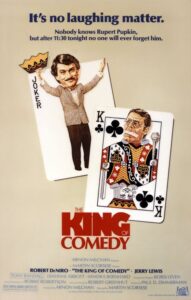
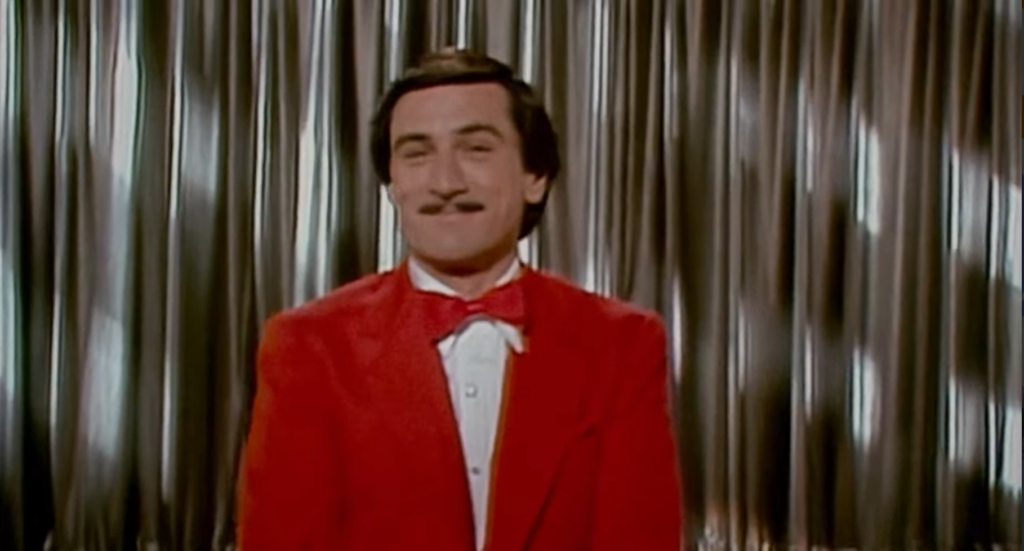
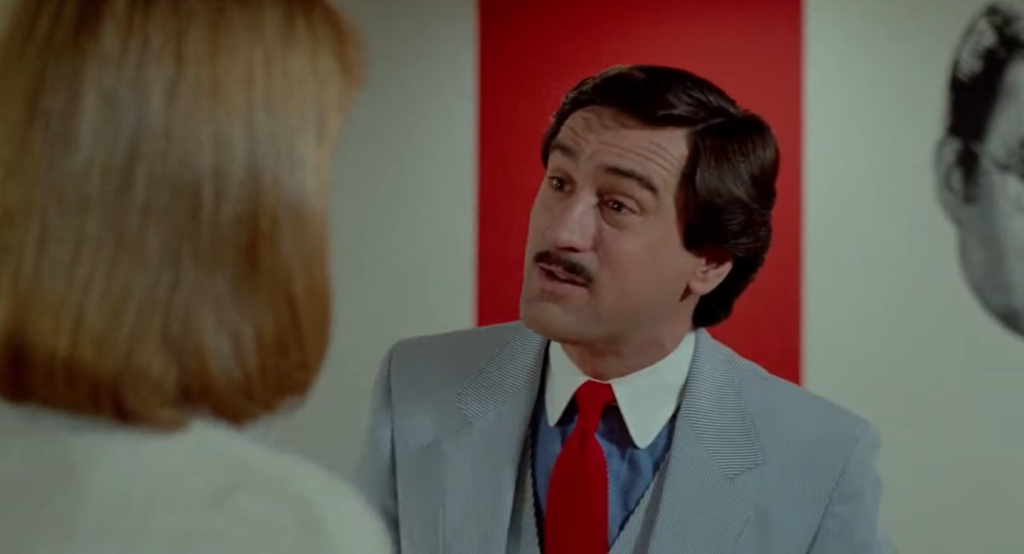
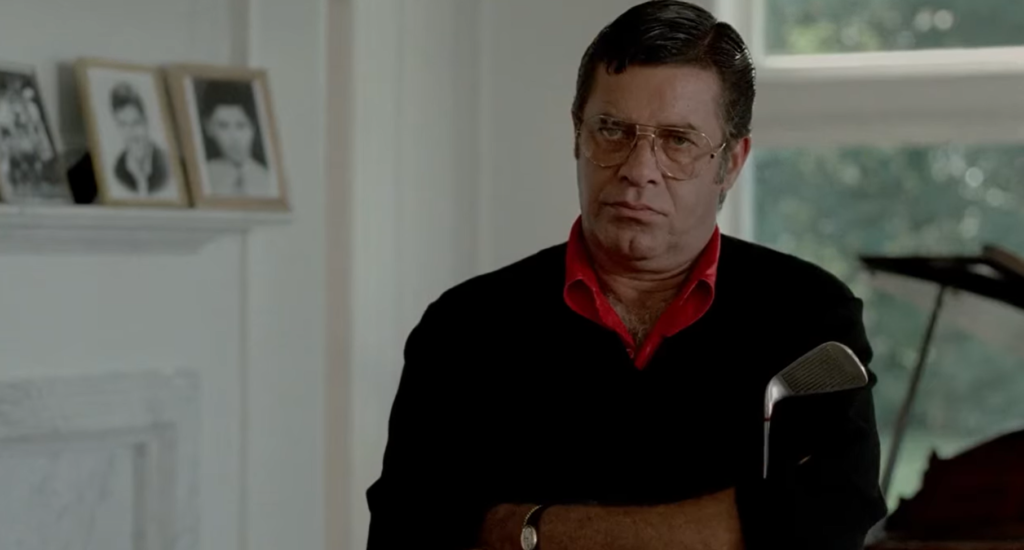
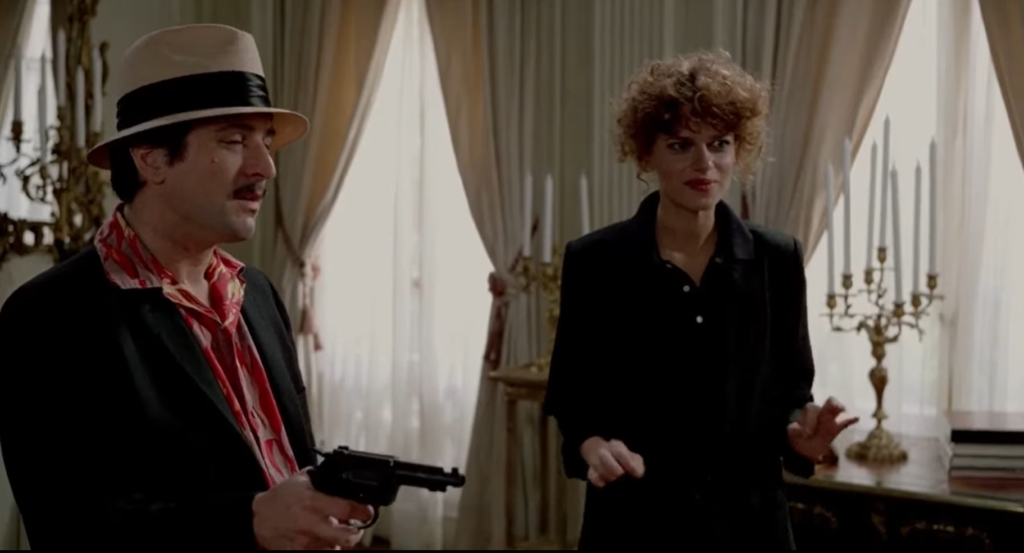
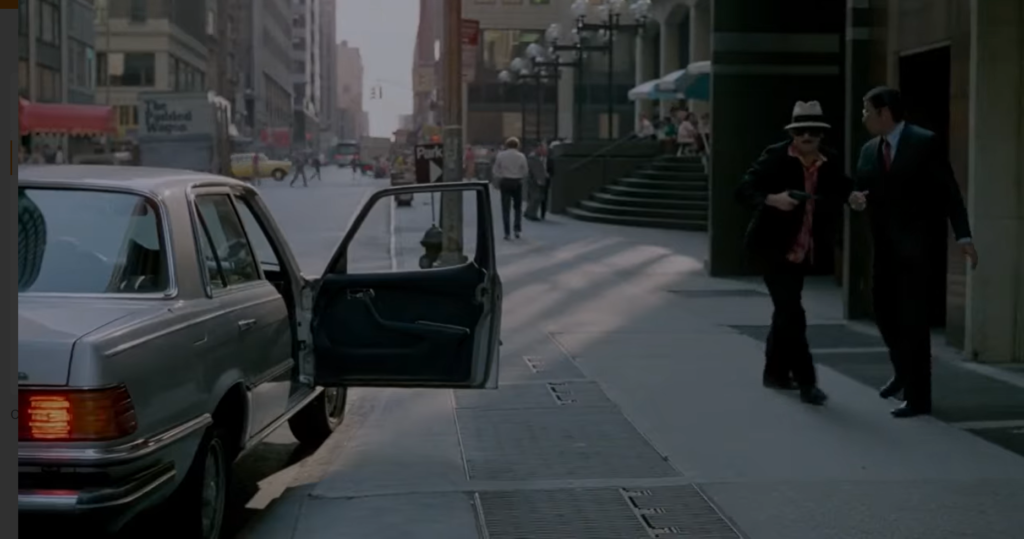
3 thoughts on “King of Comedy (1982)”
Robert DeNiro’s long and successful partnership with director Martin Scorcese has produced some of the best films of the last 30+ years. In their films, DeNiro usually plays dark and disturbed loners whose volatile nature makes them a threat. It comes as a pleasant surprise to find in the Scorcese-DeNiro oeuvre ‘The King of Comedy’, their first venture into comedy.
While DeNiro’s Rupert Pupkin is still a loner-crazy, his comedy-plus performance is faultless. The major asset of the film though is Jerry Lewis, as a ‘Late Night’ host-type icon. After years of playing the sidekick idiot to Dean Martin (as well as countless “kid” comedies), Lewis for the first time plays it straight. His embittered, show-biz-like personage brings to the film a reality that is essential to the film. His performance has left me wondering where his acting awards have gone.
QUOTES: Rupert: “Better to be king for a night than schmuck for a lifetime.”
An absolute must for all ffs!
And I don’t say that easily – but it’s a conclusion after several viewings. I don’t recall what I thought of it when I first saw it (on its release). Offhand, I don’t think the first viewing of this will be an easy one even for the average ff. A few months ago, I tried watching it after many years (cause TCM showed it) and, halfway, actually had to stop the recording I’d made of it: the relentlessness of it all was kind of overwhelming me.
Soon after, I watched it with someone (a good idea not to watch this alone first time out) and appreciated it in a different light. I’ve since just watched it again (this time alone) and, gotta say, I think ‘TKOC’ just seems to get better each time I see it!
From the near-opening freeze frame of Bernhard’s claw-like hands on the inside of a limo window (as the opening credits roll while we listen to Ray Charles’ velvety version of ‘Come Rain or Come Shine’), we then get scene after scene after scene of expert and riveting filmmaking. This really is one seriously unsung flick.
Though it’s now hard to point out fave sequences, I suppose the two that stick out for me most are the early scene in which DeNiro takes (then wife) Diahnne Abbott out for dinner (and shows her his autograph scrapbook) – and the masterful, extended sequence in which DeNiro and Abbott show up unannounced (and very unwelcome) at Lewis’ home. (Though I also have to cite a ‘fondness’ for the scene in which Bernhard is practically having an orgasm just being in the same room with her idol – a tied-up Lewis – and reveals to him the fullness of her state of arousal: “I wanna be black!”)
Across-the-board (down to the smallest role), performances here are spot-on. But it’s certainly DeNiro’s movie – and he runs with it!
If I have any (small) criticism, it’s that the near-end sequences seem to lose steam a bit – which is mainly because, when it comes time to hear DeNiro’s stand-up routine on tv, (as one character remarks) it’s not all that funny. There’s a certain low-brow quality about it which…well, should we really have expected anything else? And, besides, the audience in front of him seems to eat him up, so…
Something of a masterpiece, in its own way.
Notes:
– Abbott is seen to very good effect in a small role in Scorsese’s ‘New York, New York’, singing ‘Honeysuckle Rose’.
– Just over ten years later, Lewis turned in another memorable dramatic performance in Emir Kusturica’s must-see, ‘Arizona Dream’. (But avoid any truncated version out there.)
The film’s savaging of the cult of celebrity looks more and more prescient as time passes. I read that someone (possibly Scorsese himself) said that it was a reaction to the last five minutes of ‘Taxi Driver’ – it’s easy to forget that Travis Bickle ends up lauded as a hero because it felt rather rushed and tagged on. The theme was so vital it needed more room to breathe – and TKOC was the result.
One of the moments of brilliance in the film is that Rupert’s stand-up isn’t too bad, just kind of average. Modern filmmakers (including Scorsese himself probably) would make it obviously ‘bad’ so that we got the message. In those days, it was possible to assume that film audiences weren’t complete imbeciles.